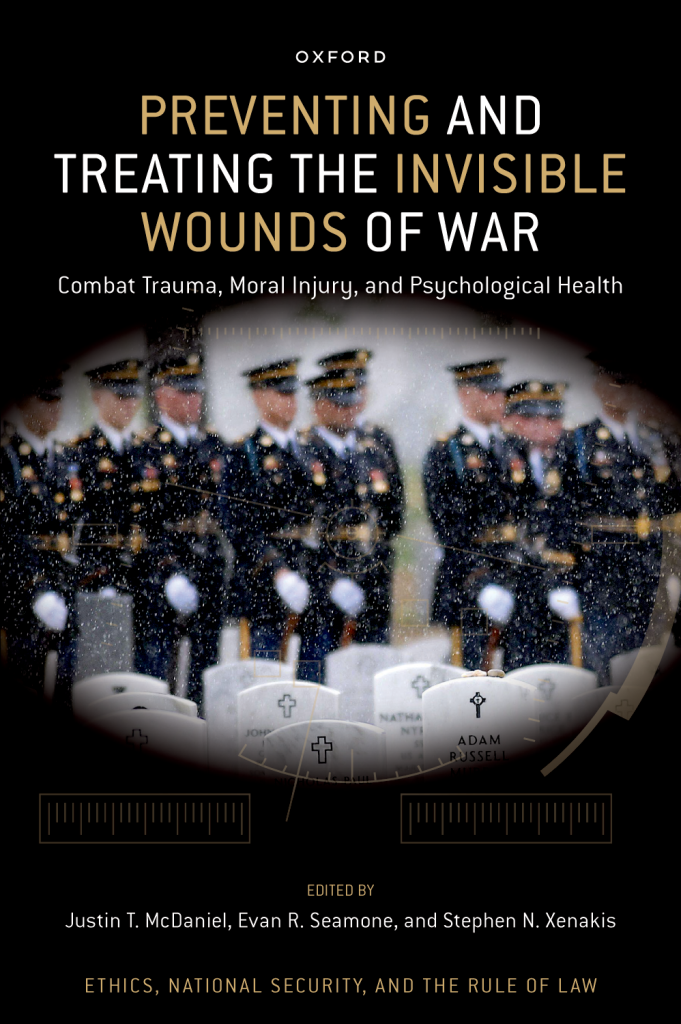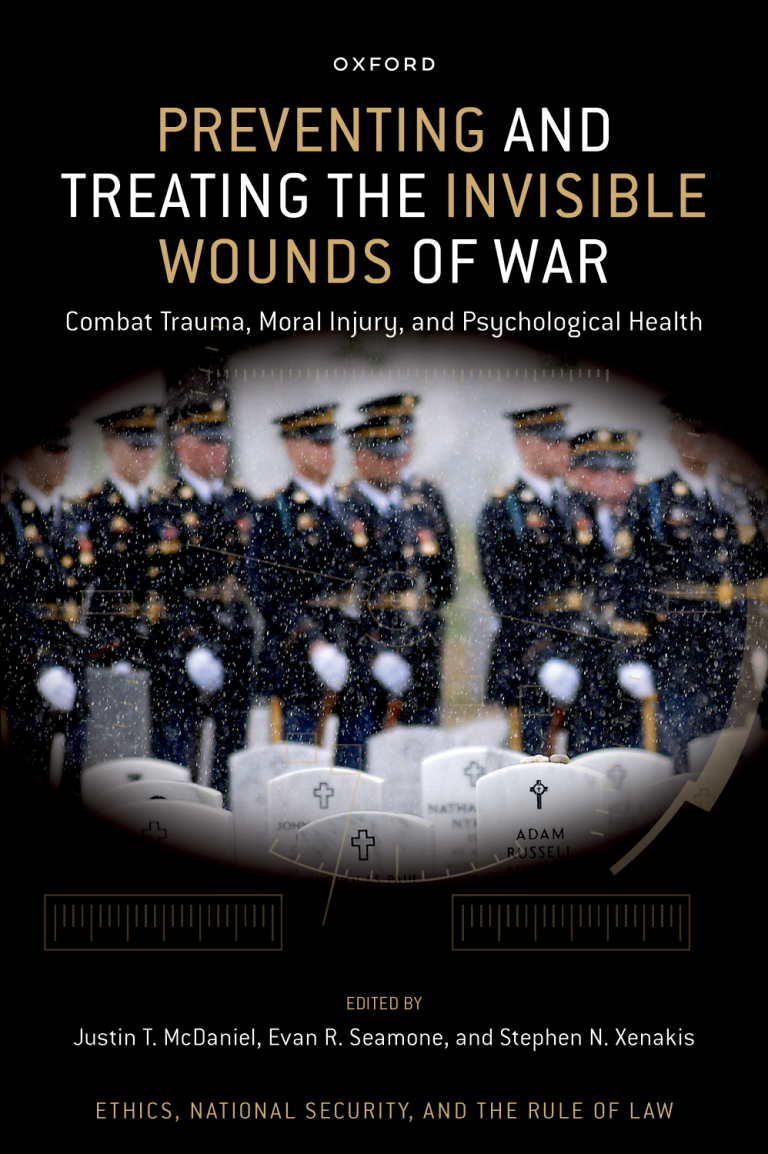This Veterans Day, on a day when we honor the men and women who have bravely served our country, the Center for Ethics and the Rule of Law (CERL) is pleased to announce the publication of its twelfth edited volume with Oxford University Press, Preventing and Treating the Invisible Wounds of War: Combat Trauma, Moral Injury, and Psychological Health.
“This important volume brings together papers reflecting a multidisciplinary range of issues connected with combat-related trauma and the phenomenon known as ‘moral injury,’” said Professor Claire Finkelstein, CERL faculty director and editor of the Oxford series. “The breadth of issues it covers and the sophistication of analysis are pathbreaking. The volume is sure to be an important resource for scholars and policymakers alike.”
Over 30 experts contributed to the 15-chapter volume, which considers new psychological costs of war, such as moral injury, from an interdisciplinary perspective and urges policy changes, including that moral injury be considered for the Diagnostic and Statistical Manual of Mental Disorders (DSM) and that it be considered in formulas for Veterans Affairs disability ratings. The contributors assembled to develop their ideas in part at a 2015 CERL conference on the financial, societal, and moral impacts of mental health-related combat injuries.
The volume was edited by Justin T. McDaniel, PhD, an Associate Professor of Public Health in the School of Human Sciences at Southern Illinois University, Carbondale; Evan R. Seamone, LPD, LLM, JD, MS, MPP (U.S. Army, Retired), former fellow of the National Institute of Military Justice and advisor to the Veterans Justice Commission of the Council on Criminal Justice; and Stephen N. Xenakis, MD Brigadier General (Retired), United States Army, an Executive Board Member at CERL, and Adjunct Professor at the Uniformed Services University of Health Sciences. It is dedicated to the enduring memory of Major Seamone, who died suddenly a few months before its publication, and his commitment to doing what is justified and right for service members and veterans.
“CERL salutes the veterans and their families today with the volume Preventing and Treating the Invisible Wounds of War,” said Brigadier General (Ret.) Xenakis. “This publication memorializes the dedication and commitment of the men and women that have served in the military and defended the country. Admiral Michael G. Mullen, former Chairman of the Joint Chiefs of Staff from 2007-11, reminds us in the Foreword that the nation cannot forget the sacrifice of the men and women it calls to risk their lives for our freedom and security. The cost and impact of the physical and mental health consequences of combat remain for decades, after the shooting has stopped. The men and women that ‘get into the fight,’ either on the ground or as leaders, often find themselves haunted by the decisions and moral acts they have committed. War has enduring impacts. The volume is being published to support the veterans and remind us of the nation’s lifetime obligation to them.”
“This volume is a small step in the direction of having moral injury, an invisible wound of war, more formally recognized as a preventable and treatable diagnosis,” said Professor McDaniel. “Without continued research and the building of evidence around issues related to moral injury among service members and veterans, we will never experience the same joy as those who fought for years to get PTSD included in the DSM. We provide important guidance on next steps for the moral injury research community—steps that could lead to the establishment of systematically institutionalized services to help our nation’s service members and veterans.”
Through its multidisciplinary approach, Preventing and Treating the Invisible Wounds of War helps practitioners, advocates, and policymakers understand the impact of historical and recent wars on U.S. military veterans. The chapters address newly recognized conditions, such as moral injury, military sexual trauma, and remote combat trauma as precursors to more serious diagnosable mental health disorders with the goal of addressing how these conditions can be identified and mitigated in future combat operations. The chapters also provide new insights on calculating the costs of wars in terms of dollars spent on treating mental health conditions, the intergenerational impact of combat trauma on families and future generations, and involvement in the criminal justice system of those who do not receive treatment due to discharge characterizations from military misconduct.
The volume is part of the Oxford Series in Ethics, National Security, and the Rule of Law, an interdisciplinary book series that grew out of CERL’s work to address abiding questions at the intersection of national security, moral and political philosophy, and practical ethics.
The 15 chapters are organized into three distinct sections:
- The first, entitled The Uncounted Costs of Military Service: Societal Burdens of War Trauma, addresses the mental and physical costs of military service that persist long after the shooting has ended, impacting not only our nation’s veterans but also their families, the communities in which they take part, and systems like hospitals and prisons.
- The second, The Moral Costs of Warfare: Understanding Moral Injury, examines a topic that has garnered increasing attention from the military, academic, and journalist communities alike: moral injury. Too often, the men and women who engage in warfighting are afflicted with shock and haunted by their moral choices on the battlefield.
- The third, Mitigating the Uncounted Costs of War, considers lessons learned over the past two decades as well as novel approaches being developed to help heal the wounds of war, including those emerging from the increasing complexity of 21st-century war, to help future leaders wrestle with the critical question of how to support, and alleviate the burden on, service members and veterans.
For the full table of contents and a complete list of contributors, see: https://global.oup.com/academic/product/preventing-and-treating-the-invisible-wounds-of-war-9780197646588?cc=us&lang=en&#








